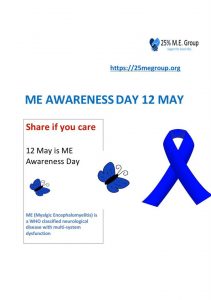M.E. Awareness 2020
NICE Draft Guidelines
We are studying it and will produce a response in near future
https://www.nice.org.uk/guidance/indevelopment/gid-ng10091/consultation/html-content-2
Letter to BACME
This to ask questions concerning the position statement that they released in October 2020
Charities call for removal of GET and CBT from NICE Guidelines
As charities supporting people with M.E. we have been actively campaigning for NICE to remove the recommendation of Graded Exercise Therapy (GET) and Cognitive Behavioural Therapy (CBT) in the guideline for M.E./CFS.
Patient surveys conducted by charities and groups including Forward-ME have repeatedly shown the harm that can be caused by these therapies, even when delivered by an M.E. Specialist. While this guideline is under review we are calling for NICE to remove the recommendation and add a health warning stating the risks associated with GET and CBT.
One of the main considerations during the guideline review is the evidence for GET in particular. It is therefore appropriate that they take this action in response to the legitimate questions and concerns that have been raised over its safety and effectiveness.
25% ME Group stance on exercise
We are extremely concerned that some medical/care professionals and sports/exercise specialists are still recommending exercise programmes and/or graded exercise therapy (GET) to people who suffer from ME without even adding very prominent warnings about the harm that exercise can cause to ME sufferers – especially those with severe ME
Letter to NICE concerning removal of GET from NICE Guidelines
ICC Definition for M.E.
Myalgic encephalomyelitis is an acquired neurological disease with complex global dysfunctions. Pathological dysregulation of the nervous, immune and endocrine systems, with impaired cellular energy metabolism and ion transport are prominent features. Although signs and symptom are dynamically interactive and causally connected, the criteria are grouped by regions of pathophysiology to provide general focus.
‘CFS’ and M.E. comparison chart
https://www.hfme.org/comparisonchart.htm . This chart illustrates the many differences between Chronic Fatigue Syndrome (CFS) and Myalgic Encephalomyelitis (M.E.). As this chart shows, despite what many groups claim, CFS and M.E. are not the same.
Dialogues for a neglected Illness – or Dialogues for ME/CFS,
An informative new video series, produced in the UK, called Dialogues for a neglected Illness – or Dialogues for ME/CFS, produced by Josh Biggs and Natalie Boulton, includes two fifteen minute videos about Severe ME: Severe & Very Severe ME/CFS; and Symptoms and Management of Very Severe ME/CFS. These can be viewed and shared for free online.
Severe & Very Severe ME / CFS – Dialogues
“Symptoms & management of very severe ME/CFS” (19 minutes)
Comments from doctors/clinicians/researchers, patients & carers
Dialogues for a neglected illness – or Dialogues for ME/CFS is a new project being made with an award from the Wellcome Public Engagement Fund. More information here. The project will consist of a website with a collection of about a dozen new short videos, accompanied by links to existing educational and reference material. It will create a vivid, multi-faceted picture of ME/CFS, covering different aspects of the disease from a variety of perspectives, which will include – diagnosis; various management and treatment issues; Severe ME and the support doctors can provide; key symptoms described by patients in their own words –short and long term experiences and differing severities; patient advocates’ concerns; and the broader historical, social, medical and cultural context for the disease. It will create a resource which patients can use to help their doctors and other health, education and research professionals understand more about this disease and the issues faced.
ME Awareness 2020

More than 21,000 Scots suffer from ME which is also known as chronic fatigue syndrome
Scottish ministers are being urged to withdraw a controversial treatment that is prescribed on the NHS to treat myalgic encephalomyelitis (ME) but is blamed for leaving many victims housebound or crippled
https://www.thetimes.co.uk/article/me-sufferers-demand-end-to-exercise-treatment-9ncc9nw6n.
ME Awareness Day 2020
20 April 2020
Opposition to Oxford Health NHS Foundation Trust: “Coping with Coronavirus: Fatigue
COVID19 and the rights of disabled people
Very important. Please sign to protect the lives of disabled people. Let others see this post Click below where it says “view post” to see the full post and to access the link to read and sign the letter
“…………… However, we have read about cases that have made us feel worried that the principles on which the NHS are built are sometimes not being upheld. We are concerned that the rights of disabled people, of all ages, as set out in the Human Rights Act (1998), the Mental Capacity Act (2005), the Adults with Incapacity (Scotland) Act (2000), the Equality Act (2010) and the United Nations Convention on the Rights of Persons with Disabilities (2006) and the Convention on the Rights of the Child (1989) are not always being upheld. NHS staff normally use these laws to help make decisions about people’s treatment. In this crisis it’s more important than ever that all NHS staff follow them………………..”
https://www.disabilityrightsuk.org/news/2020/april/covid-19-and-rights-disabled-people
This film will give you an introduction to PEM (Post Exertional Malaise). Once you’ve understood what PEM is about, you’ll know a lot more about the debilitating chronic
“Useful medical information when treating COVID-19 in patients with underlying myalgic encephalomyelitis/chronic fatigue syndrome (ME/CFS) & severe fibromyalgia (FM)”
LETTER TO SEND TO SHOPS TO HIGHLIGHT ISSUE OF SHOPPING PROBLEMS
I have an illness known as M.E. (Myalgic Encephalomyelitis): this is described by the W.H.O. (World Health Organisation) as a neurological diseasei, making it similar to illnesses such as Multiple Sclerosis, Motor Neuron Disease and Parkinson’s.
The NHS is mandated to implement M.E. as a physical, neurological disease.
Letter sent to major supermarket chains and UK Government from UK ME charities and the All Party Parliamentary Group on ME
Coronavirus Bill could leave thousands of Disabled people without support
The bill potentially poses a serious risk and can put the wellbeing of many at real danger. We ask you to write to your MP immediately.